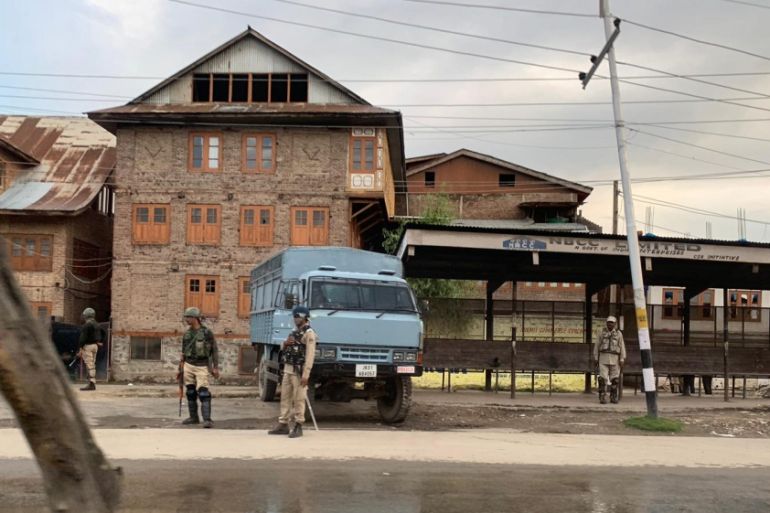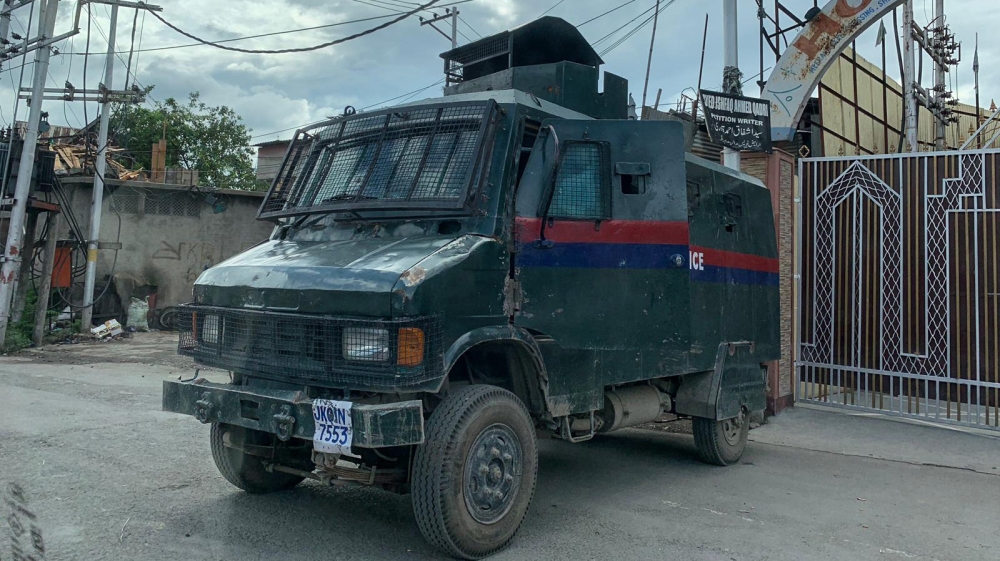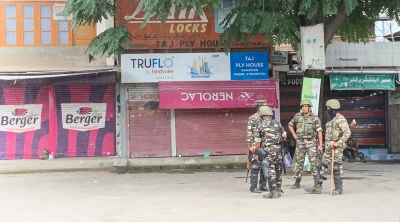‘India talked of peace and calm in Kashmir. I saw the opposite’
A first-person account of life in Srinagar after India imposed curfew and a communications lockdown.

The Indian government revoked the special status accorded to Indian-administered Kashmir in its constitution earlier this month.
A presidential decree issued on August 5 revoked Article 370 of India’s constitution, which guaranteed special rights to the Muslim-majority state, including the right to its own constitution and autonomy to make laws on all matters except defence, communications and foreign affairs.
Keep reading
list of 4 itemsWorld Press Freedom Day: Gaza conflict deadliest for journalists
Israeli firms sold invasive surveillance tech to Indonesia: Report
Abu Ghraib: Iraqi victims’ case against US contractor ends in mistrial
In the lead-up to the move, India sent thousands of additional troops to the disputed region, imposed a crippling curfew, shut down telecommunications and internet services, and arrested political leaders.
This is a first-person account of what life was like in Srinagar amid the curfew and lockdown.
I arrived in Srinagar with my sister on August 1. Having grown up in Kashmir, I didn’t think too much when I saw the shuttered tourist information desk at the airport and the military presence.
Driving home, I noticed that the military presence was larger than normal in what is already one of the most militarised zones in the world. It was the peak of the tourist season, thousands of Amarnath Yatra pilgrims were visiting, and with Eid and the wedding season around the corner, the streets were busy.
The following morning, I woke up early. My phone was buzzing with messages from friends and family asking if we were OK.
News channels were reporting that pilgrims and tourists were being asked to leave the valley immediately due to an increased security threat. My cousin later told me how the military instructed him to check all guests out of his hotel within two hours.
There was growing unease and nervousness. People started stocking up on food, fuel and the necessities. There was chaos and panic across the city as people queued to get what they can before any rumoured curfew was imposed.
First hand account of ground reality in #Kashmir Aug 2019 https://t.co/69IDxymYoK #StandwithKashmir #KashmirBleeds #KashmirUnderThreat #Kashmir pic.twitter.com/eaFyIWMeQI
— Alsasha (@shubly) August 21, 2019
At 10:20pm on August 4, the internet was blocked. By midnight, a blanket curfew was imposed. We woke up in the morning to realise that cable TV was down and landlines were not working.
We found an old radio and were able to listen to the news from a crackling AM channel; the Indian government had unconstitutionally and illegally revoked Article 370 of the constitution. All political and civil leadership had been arrested, invoking fear and sending shivers down our spines.
That evening, I went to bed unsure of what the future holds for our people.
On August 7, my cousin arrived at our house, having driven through the curfew. She had borrowed a satellite phone and I managed to speak to my husband in the UK. I reassured him that we were safe and give him a list of people to call and tell that their loved ones were also safe.
That evening, my cousin and I drove across the city to see my in-laws. The same streets that two days ago were full of people, vehicles and animals [for Eid] were now deserted, barbed wire coiled across them.
We saw a group of civilians shouting slogans, beating their chests and screaming at the military on the main road.
There were burning tyres which were being picked up by the army and thrown into Dal Lake. Metal bins blocked the road.
I was seeing my cousin after two years and, instead of catching up on life, we were driving across Srinagar in silence. The only conversation was at checkpoints when the military asked for IDs.
We spent the days at home, entertained by the stray cats and our own animals. In the distance, we could hear shouting, loud bangs and blasts. Loud sounds would make us all go silent. Helicopters circled low above us regularly.
We had limited opportunities to go out in the evening and when we did, we saw very few people out walking.
We were able to buy some necessities from the few shops that lifted their shutters partially in the evenings. But mostly we resorted to finding out where shopkeepers lived and going to their houses to collect items we needed.
The shepherds were distraught – with Eid approaching, they were unable to sell their cattle. They said they could not afford to keep them.
Eid itself was a subdued affair instead of a huge celebration. The large mosques were reportedly open but for their safety, people opted to visit their local ones.

There were no children dressed in finery walking around and showing off the toys they’d purchased. No street vendors with sweets and savouries for people to enjoy. The roads were eerily quiet.
A few people were out distributing meat from the animal sacrifice they had made. Most were not able to carry out the religious ritual this year.
We spoke to some locals who had stopped us, they told us how they felt their lives were ruined and now they had nothing to live for.
By August 14, the curfew became stricter. It was Pakistan’s independence day.
We did not attempt to venture out and by early afternoon, we could hear protesters. Over the next few hours, the blasts and bangs got closer. I saw people, including women, running past the house followed by the military firing tear gas and throwing pepper spray canisters into houses.
We weren’t able to shut our windows quickly enough and the house filled with gas quickly. My parents are asthmatic and struggled as we tried to clear the air in the rooms. The pepper spray made my sister throw up. I was spared as I was on the roof looking at what was going on outside.
|
|
Later, the troops went house to house, searching.
The news that evening, meanwhile, made no mention of the unrest, fear, restrictions and injuries in Kashmir that day.
August 15 was India’s independence day.
I watched the news and broadcasts from the central government, celebrating democracy and freedom. Prime Minister Narendra Modi talked about the Indian people’s joy about the Kashmir decision – I marvelled at how a nation of a billion people can rejoice over the misery and occupation of people.
People are afraid that with no transport, no safety and no communication, they can not work and may lose their jobs. The city was completely locked down. You could hear and see the military celebrating with fireworks. They celebrated alone.
Then came August 16, my last day in Kashmir before I flew out. We left home at the crack of dawn even though our flight was not until 5pm. We had no way of confirming our ticket or knowing if flights were operational.
At the airport, more troops were arriving with their bags. A cavernous silence reigned in the terminal. We boarded the 200-passenger plane, there were barely 50 of us.
The safety announcement blared over the speakers and asked us to ensure our seat belts were fastened, seats were upright and the window blinds were open.
I noticed the blinds were shut. I tried to open them but the cabin crew instructed everyone repeatedly to keep the blinds shut. The aircraft slowly taxis and takes off.
Whenever I leave Kashmir, I take a picture of the valley from the sky. Now, this small token was taken away too.
